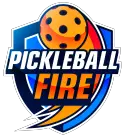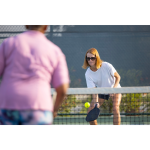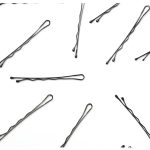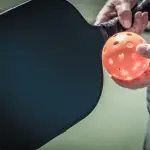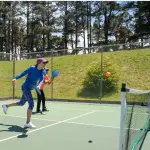Today on the Pickleball Fire podcast, I’m talking with sports psychologist, Jenn Jacobs. We discuss positive thinking on the court, how to improve your confidence, and the importance of lacing up your shoes.
Mentioned in the Show
Click Here to Subscribe to the Pickleball Fire Podcast
Show Notes
- Introduction to Jenn and her background in sports psychology
- College professor teaching sports psychology classes at university level
- Conducts research in the area of sports psychology
- Focuses on sports as a tool for social change
- Sports psychology and achieving peak performance
- Aim to help athletes perform at their best despite challenges in highly evaluative situations
- Project Flex and its impact on at-risk youth
- Fitness Leadership Experience program
- Based in youth prison facilities outside the Chicago area
- Uses sports to help incarcerated teenagers build life skills
- Benefits of sports: physical, psychological, and social skills
- Introducing pickleball to Project Flex
- Initial resistance due to preconceptions about the sport
- Changed mindset and excitement for the sport after a few weeks
- Playing pickleball in public settings helps build confidence
- Life skills learned from playing pickleball
- Overcoming obstacles, mental strength, and reframing mindset
- Transferring sports-related life skills to everyday life scenarios
- The importance of context in skill development
- Building Confidence and Staying Positive in Pickleball
- Reassure yourself through past performances
- Observe and learn from players slightly more advanced than you
- Surround yourself with supportive people
- Normalize emotions
They also explore the value of pre-performance routines, such as the “lace-up approach” and using music to get into the optimal zone for performance. During a match, having a physical reset habit and using transition times for breath resets and positive phrases can help maintain focus and confidence. By understanding your patterns and implementing coping strategies, you can improve your mindset and overall performance in pickleball.
Show Transcript
lynn: Today I would like to welcome to the Pickleball Fire Podcast, Jen Jacobs. How are
jenn: you doing today? I’m great, Lynn.
Thanks for having me.
lynn: I’m really excited to have you on because we talked a couple weeks ago, had a great conversation about just different things going on in pickleball, especially related to how the game can help people, the mental aspect and whatnot. So I do though, however, or wanna start with a little bit about your background in terms of how you got into pickleball, how you first heard about the game and how long ago that was
jenn: Sure. Yeah, I think I heard about pickleball several years ago, maybe a decade ago when it first sort of popped up as a sport that’s an alternative to tennis. And I think like maybe some other people, I had a little bit of a bias about. who generally might play a sport like pickleball. And I thought since I don’t necessarily fit that age category, that’s not really interesting to me.
But like many other people, when the pandemic happened and we’re all stuck in our houses We were looking for some sort of activity to do. And so pickleball came up as something that is sort of safe to do outside. So I got into it in the summer of 2020 and really haven’t looked back since.
I’ve only been playing two and a half years. But if we were to count the tallies of how many times I’ve played it’s probably doesn’t look like an average two and a half year old player of a game.
lynn: And from what I understand too is you’ve reached a pretty high level in the sport in just those two and a half.
jenn: Yeah, possibly. I’d say I’m somewhere between like a 4, 5, 5, oh, I’m competing in five oh tournaments and having some challenges there. But have had some success at the four, five level. So have a generally athletic background, but I’ve never really been a star at a sport before. So it is kind of fun to explore what it’s like to play at some competitive levels.
lynn: and I like the fact that you do really now have a very high level pickleball background, but you also bring in another aspect of something that you need in a sport is really trying to benefit your performance also from a mental perspective. So gimme a little background what it is that you’re doing professionally and then how that relates to pickle.
jenn: Absolutely. So for my job, I am a college professor and I, my expertise is in the area of sports psychology. So I teach sports psychology classes to university level students, both undergraduate and graduate. And I also conduct research in the area of sports psychology and am involved in some outreach programs.
Uses sport as a tool for social change, which is sort of one avenue. People will go in the sport psychology realm. So trained as PhD in psychology with that focus in sport and have a pretty cool sort of, Chance to apply what I teach in the classroom into now my life as sort of an athlete competing in tournaments or playing recreational play.
And so the sort of the premise of sports psychology is to look at how you can get athletes of any level into their kind of peak performance zone, performing at their very best, despite all of the challenges that we all face in sort of highly evaluative situations.
lynn: And as you spoke there, I was thinking about a lot of different ways I wanna go in terms of my next questions. But you know, one of the most interesting things I think from that you’ve talked about and we’ve talked about already together, is how sport can help with social change. And I know you’ve got a program that you’ve developed over the years.
If you can talk a little bit about that and how pickleball kind of fits.
jenn: Absolutely. I’m very proud of a program that we’re in our fifth year of existence now, and it’s a program called Project Flex. And FLEX stands for Fitness Leadership Experience kind of the acronym going there. And what the program is a sport leadership program.
Based in youth prison facilities outside of the Chicago land area, so kind of scattered throughout the northern Illinois area. And basically we’re looking to use the power of sport for teenagers who are incarcerated to help them reimagine what their possible future could look like through getting opportunities to build their life skills.
Experience, sort of the teachable moments that arise in the sport setting of winning and losing and solving conflict and learning about themselves and their talents and how to exist with other people socially. and so there’s a whole host of research that looks at sort of the many benefits that can come from sport, and most likely we all think of the very physical benefits.
You’re going to increase your cardiovascular fitness and it’s going to help with strength and conditioning. But there’s this whole other field of benefits that can occur related to your psychological skills and then also your social skills. And so we use the, sort of the vehicle of sport as a way to get youth who have come from really tough backgrounds, made some really poor decisions in life and sort of are dealing with rehabilitation of that.
we use sport as this opportunity to one, get them excited about something cuz you know, they live kind of tough lives being incarcerated. But two, give them chances to sort of work towards improvement and start to recast what their life could look like after they’re released from the prison setting
lynn: It’s interesting because I could see working with that group in terms of and especially like a lot. Young people with maybe a sport like basketball and even you said that you had some bias towards pickleball when you first heard about it because of it tend to be played, especially at that time by people who were definitely 50 and over.
But a lot of the people that you know within that, in. Setting, probably never heard of the game, but even once they’ve heard of the game, they might not take it that seriously because it’s pickleball and hence kind of have that bias towards it.
jenn: Absolutely there were some barriers introducing the sport.
So first off, I should back up. So I had been working with this group of kids for a while. So I did have an established relationship with them to where I maybe had a little bit of capital when I said, Hey, I’m gonna introduce this new sport to you. And because they knew me and were sort of in the realm of, okay, if Dr.
Jay says to try something, well, maybe I’ll try it, but. It was definitely met with some resistance. I heard this is an old people sport. This is a white people sport. They called it prickle ball cuz they didn’t actually know the name. There were all these different ideas of what they thought it was called.
But once I started to kind of help speak their language and show them this is a new up and coming sport and younger people play it, I was able to show them pictures of. Some of the really cool professionals that are excelling in this sport that maybe look like them or inspire them in some way.
Then they started to kind of think, okay, all right I can dig this competition. And it only took I’d say a couple weeks to get them excited about it. And two, three months in were we were given permission to start playing at a local park. Off the facility grounds. So we were mixing in with people from the public and they were getting a lot of confidence, being able to go up to people like, Hey, do you wanna play?
And it was eventually something where they drank the Kool-Aid, I think like probably most of us. And now they’re itching to get back out when the weather’s nice again. .
lynn: Yes. And hopefully that is sometime soon, although I have to admit, I’m cheating right now. Normally in Connecticut, but I am in Florida, so I’m enjoying a couple weeks here.
Now, one of the things you talked about With the kids was that they learn life skills from playing pickleball and what they learn may be very different than a 50 or 60 year old or even a 30 year old who maybe hasn’t played a sport before. What kind of life skills do people learn who aren’t necessarily in their situation, but you know, really the adults kind of coming into the game?
jenn: Sure. I think pickleball can. Virtually any life skill that’s out there. And it often will depend on who’s playing it and what they most need to learn. So very obvious ones that come to mind are how to overcome obstacles. I think pickleball is a very mental game. It can be compared to some of the other rapid sports and tennis is considered one of the most mental games out there.
And I think pickleball has a lot of those same elements to where you’re experiencing that kind of sense. Loneliness out there on the court. Even if you do have a doubles partner, you sometimes might feel alienated, like, oh my goodness there’s just me out here and I’m making the mistakes and there’s nothing I can do.
So that sense of being able to overcome an obstacle and sort of reframe your mindset to be positive and present so that you can just function and play is a big one. And sort of what the philosophy of our program Project Flex does is looks at how you can take that life skill in the sport setting that’s highly relevant and then transfer that into actual life.
So what does overcoming an obstacle look like in my profession or with my family or friend group and. Starting to recognize that those same mechanisms that are at play in sport and that you get to sort of test and exercise in this sort of small Petri dish of a scenario can just be expounded upon in everyday life scenarios as well.
It’s sort of the same muscle that you’re using. Just a different context.
lynn: One of the things that you just mentioned was that pickleball can help. Learn is how to be more positive because it is tough. Sometimes we play, we’re not that consistent. We’re all human. We make mistakes. We’re mostly not professionals earning a living from it.
How do you stay more positive?
jenn: Yeah that’s the key. We all wanna know, right? I think there are some ways we can reorient our thought processes to, to be more positive. And some of that takes place, encour, and some of that takes place pre-performance and sort of the habits that we create for ourselves before we’re playing.
But a couple of those things come down to like how to build confidence and there’s sort of the gold standard theory for how to build confidence is self-efficacy theory. And it’s my favorite theory of all time, and I won’t go down the academic rabbit hole of all of the mechanisms behind it, but I’ll kind of give a couple takeaways for how generally you can sort of build confidence or keep a positive mindset.
The most positive sort of source in our life that helps us stay positive is actually our own thinking about our past performance. So it’s funny, we’ve got sort of all these environmental sources that can potentially make us more confident or less confident, but we’re all sort of self-centered, whether we want to recognize it or not, that we use our own thinking about ourself as sort of a higher.
Source of information than anyone else. So one way to use that to our advantage is to think about successful past performances you’ve had in the pickleball world. And then that provides us sort of this ease and confidence in our mind that helps us sort of. Block out any of the negatives. So when our mind recognizes, yes, we’ve been here before, I’ve played in a tournament before, or I’ve played against these opponents before, or I’ve played in this kind of wind before, then it starts to feel that ease of familiarity and like, oh, well if I’ve done this once, I’m able to do this again.
If I’ve played with this level of people before, I should be able to navigate it and get through it this time. So that’s sort of one thing. It’s almost reassuring yourself through past performances. Another source to help build confidence is to watch and study other people that we relate to ourselves.
And people may think, oh yeah, let me just flip on YouTube and watch the pros and that’s gonna take care of that source. Unfortunately, unless you’re close to a professional level yourself, that source is not going to be motivating cause we. Perceive ourselves to be on the level of most professional players.
Instead, it looks like finding someone who’s maybe just a little bit more advanced than you, just slightly a notch above you, and finding a chance to play with them, observe them, watch them, and then our brain is going to start to do the thing, oh, if that person can navigate this or perform this way or do this skill, I can probably do that too, because I’m not too far different than them.
and then sort of just summing it up, there’s two other minor ways we can start to reorient our confidence. And really simply stated, that’s just finding people that lift you up and give you sort of that support that you need. So I always say like, find your best pickleball partner. There’s always somebody out there who you inevitably say, oh, I play so great with them.
I can’t figure out why. , every time I match up with them or play on their side, I play so great. So find that person, try to play with them as much as possible. And then the other one is figuring out how to not let your emotions control you. Rather sort of take time to figure out how to normalize them and.
Way easier said than done. Cuz of course anybody can get frustrated if it’s a windy day or your opponents are getting tons of let balls or something like that. But if you find a way to normalize them of, yep, it’s okay, I’m getting frustrated. But that’s rightfully so because it’s an off day or. , oh, I’m really nervous.
Before a tournament. My palms are sweaty or my heart’s beating fast, but that makes sense because I really care about how I’m going to do in this tournament. It’s just sort of giving yourself permission to feel things.
lynn: That is a lot of great tips and I’m gonna circle back on a couple things and cuz I, I think confidence is something that you can be very confident before a match and then it can kinda wax and wa and one of the things that you mentioned was when you.
Focus on some of your past performances now, is that something that you should be doing before you ever step on the court while you’re on the court or after a game? What’s the timing of how you use that?
jenn: Yeah, that’s definitely a, before you’re on the court type of thing, that’s sort of what we’d call a pre-performance routine.
And so there. A lot of pre-performance things you can do, but especially leading up to an event, whether that’s a tournament or a group that you’re playing with being able to stay in as healthy of a mindset as possible is really the key there, because I don’t think people realize how much we can carry on to the court that is, can be really debilitating, whether it’s like a stressful day at work for those who are non retirees.
or a bad night’s sleep or something you inevitably carry on much of what’s happened already into, onto the court. And that can be really impactful in ways that people don’t even realize. I always adopt this approach. I’ve mentioned this to my athletes. I call it like the lace up approach.
And so when you’re lacing up your shoes to go play, whether that’s when you’re sitting on the sideline at the court or at home or something, From the time you’re lacing up your shoes on that’s game time. That’s, you’re doing a job now. So I try to encourage people to think about that as that’s the reset.
So everything that happens before the lace up is in the past, and everything that happens after that is game time. So forget about, leave everything else at the door, let go of all the elements of the day. And then after the lace up, all your job is to be present. And then, Potentially visualize what’s to come.
So there’s sort of another pre-performance tactic of even just the mere fact of thinking about, oh, what court am I playing at today and what does that net look like and what’s the side of the court look like and what’s the view behind me? Even just that slight visualization of just the still life of where you’re gonna be playing is going to put your mind more at ease and start.
Calm, any of the sort of fears or anxieties that start to creep in, even if it’s just a wreck game.
lynn: I have to admit I, I love the idea of that lace up app. Approach because even even for example I’m not a tournament player. I’m probably never gonna plan a tournament. Just my knees are not in good enough shape and I don’t wanna let my partner down.
But I, even as a purely recreational player, I love the thought of kind of centering yourself and knowing that let me lace up my shoes. That could be when I’m at home, or it could be when I get to the courts. But once I do that, I’m kind of Put my game face on. Cuz even in recreational play, you can have a game face and absolutely.
focusing on pickleball, not on all the stuff I need to do when I get home or just a, an important meeting that’s coming up or something like that.
jenn: Absolutely. Another way to do that besides the lace up approach is utilizing music in some way and again, this is for recreational play or competitive play or anything in between.
I think we play this sport because we love it and we all come to it for different reasons. It doesn’t have to be for purely excelling and winning, but for some people it is, and for others it’s playing your best and socializing. Music, I think is another feature that is really good pre play, pre-performance to help get you in that zone.
And what’s so interesting is finding out what music puts you in that optimal zone. I play a lot of mixed tournaments with the same partner and he and I joke because my pump up music. Like high energy, nineties hip hop music. And I won’t say any lyrics on here cuz you would have to like beep them out because there’s, it’s not appropriate for this.
But that’s the kind of like beats and music that gets me going. And he’s the exact opposite. He loves like sleepy folk relaxing music like Jack Johnson and it couldn’t, we couldn’t be on more different ends of the spectrum. But we both know this is what gets us in sort of that optimal zone to perform and.
We just never warm up together.
lynn: That makes sense. And I appreciate you not mentioning some of those lyrics because I tend to edit the podcast very little. . Got it. . All right, so one question I have and I know I’m asking this because I wanna know from a personal perspective is I might be really.
before a game think having thought about my past performances, having done the, some of the other things that you’ve suggested, but what about during a match when, you know, my confidence kinda waxes and wanes. How can I control
jenn: that? Yes. That is such an important question. So.
First thing I would say that I would work with somebody who wanted to really delve into this. This challenge is one to have an awareness of what’s sort of the. The cause of that focus waxing and waning. So is it something that’s happening in your body that you start to feel like anxiety or nervousness somewhere?
Is it something more that’s happening in your mind? So the first sort of tactic is to study, oh, what is my pattern? What tends to happen and how does that come out on the court? So for example, one. . One of my favorite people I used to play with when I started out playing pickleball would get the Ys really bad in the morning only.
And so the YPs are basically where you almost have an. Inability to perform a simple task in a sport. So it’s often talked about with pitchers in baseball where when they get the yips they’re so highly nervous and their cognitive anxiety is so debilitating they almost can’t throw a pitch that’s anywhere in, in the towards the batter.
It’s, Wild to see. And so that would happen with this individual in the morning. He would not be able to serve, he would serve every ball out and he was a pretty like advanced player. And so he knew, okay, mornings I have sort of this special pattern that happens. My mind goes ba, bonkers a little bit, like I’m gonna be aware of that and find some kind of coping strategies to deal with that. And so once you have an awareness of what those sort of either negative thoughts or negative coordination habits that happen for you are, then that’s where you can start tapping into what are your coping strategies for that.
And some of my favorite on-court techniques, you know right when you’re out there standing against your opponent. To do our first having a little reset habit. And so you’ll probably see some people have either they’ll go wipe their face with a towel on the side of the court between points or like tap the net with their paddle.
I’ve seen in more extreme cases people have like a paddle slapped, they’ll slap their leg and you can almost see where their bruise always is with where the paddle hits their leg. Wouldn’t recommend that one, but for some people, that works. But it’s some sort of like, Physical reset tactic that you’re giving yourself permission to.
Okay. Yep. Right after I tap my pedal on the net, or right after I bounce the ball a couple times, that’s my reset. I’m a clear mind. I’m starting from scratch and letting go of whatever was just happening before. I think another spot that this is really underutilized is the transition times and pickleball, which happen a lot.
So it can look like a tactic I’ve used with a pro player I’ve worked with before. We established sort of a walk back routine for this person where between points, not even when they’re on the sidelines, just between points when they’re switching with their partner instead of walking back with.
Sort of a discouraged body language that this person would have or that would be when their negative mind mindset would really take over of, Ugh, I’m losing, or, that was a horrible shot or something. Finding a way to use those couple seconds for a breath reset. So just a deep breath. Some sort of short phrase that can be positive.
Either it’s like something instructional, like fast feet or follow through or something motivational like, I’ve got this, I’m here. I can win this. And then being ready to. Serve or serve yourself. Those are sort of the moments that we forget, oh, this is a really opportune time. We can reset something here.
So I, I like to have people think about using those couple seconds. .
lynn: Those are all great tips and definitely something that the Dallas Cowboys kicker could have used when kicking extra points.
jenn: Absolutely. Yep. Good. Other sport reference.
lynn: Right. All right. Now as we talk, you’ve got. A tremendous amount going on with Project Flex.
You are a university professor and it sounds like you also do work with some pro-athletes and pickleball players. Is that something that you want people to reach out to to maybe get some help from you?
jenn: Yeah. If people are interested, I’m always open to it. I do.
Say that less and less am I working with athletes cuz I’m putting a lot of time into working with youth instead. Sometimes I just can’t resist. And the pro player that I worked with traded me lessons, physical lessons. So he trained me on skills and on physical skills and I trained them on mental skills.
So it was an awesome trade. But I’m always open to things like that and if I am not available or it’s not a great fit. I have a whole host of graduate students, masters in PhD level that are really versed in sports psychology. And because of the nature of them being my students are now becoming versed in pickleball because if you work with Dr.
Jacobs, it’s pretty much a requirement that you’re gonna have to know about pickleball. So definitely some opportunities.
lynn: I love that requirement, so if somebody wants to reach out to you and get in touch for anything that we’ve talked about today, where is the best place?
jenn: You can email me. My email address is jm jacobs niu.edu.
Also, if you’re interested at all in the Prison Pickleball program that we’re running along with the other sports that we do working with incarcerated youth, we’re always looking for more followers on Instagram That will make our graduate students very happy if you follow us and you can find us at N I U Project Flex on Instagram.
So n i u is my university, Northern Illinois University. So N I U Project Flex on Instagram.
lynn: Awesome. Well, Jen, Dr. J, thank you so much for being on the Pickleball Fire Podcast
jenn: today. Thank you so much, Lynn. Tons of fun to be here.
